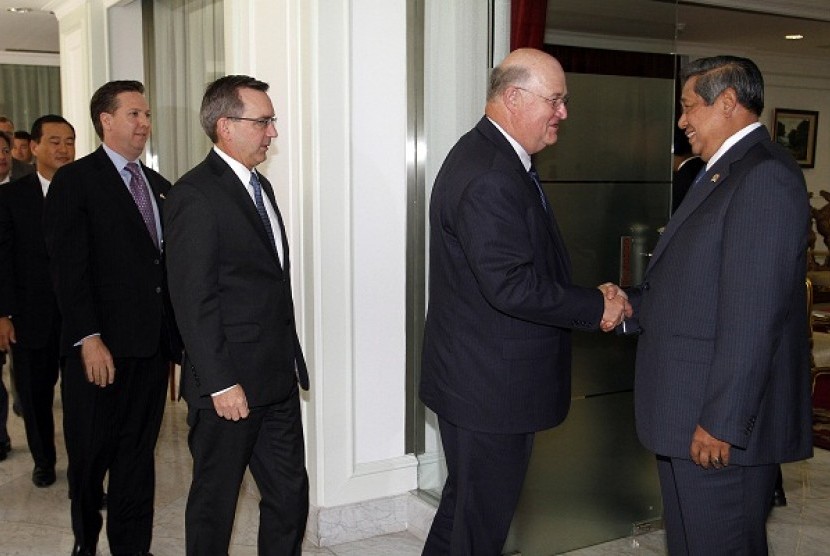REPUBLIKA.CO.ID, JAKARTA – The presence of US in South East Asia often interprets as an intention to contain China. US Ambassador to ASEAN, David Carden, refuted the suspicion on the Talks on Democracy of US Foreign Policy Towards South East Asia in Jakarta on Thursday.
“We care about environment, avian influenza, economy, deforestation, and illegal fishing. We have human and animal that are terribly stressed. That is why we are here,” Carden said.
The US also has new military strategy that designs to strengthen ties. Carden cited US Defense Secretary, Leon Panetta, who said on Shangri-La Dialogue that the new military strategy could strengthen ties through US alliance, such as Japan, South Korea, and Australia and also through partnerships with other countries, such as Indonesia and India. With the new strategy, US mobilizes 60 percent of its warships to the Pacific, with Singapore plays the significant role.
The Vice President for Studies in the Carnegie Endowment for International Peace, Douglas H Paal, explained that the US military presence in ASEAN was rebalancing, as announced by President Barack Obama last year. “It is sometimes misunderstood. The presence advances security and prosperity of the Asia Pacific region,” Paal said.
Along with the new mission, US troops also rotates through Darwin, Australia. Carden explained that the US military deployment in Darwin was, apart from series of training session and exercise, focused on disaster relief and humanitarian assistance as they did on Aceh Tsunami Disaster. “If there is an earthquake, US troops can help because US has AHA center here in Jakarta,” Carden explained.
ASEAN Coordinating Center for Humanitarian Assistance on Disaster Management (AHA Center) is functioned to gather information from hazard monitoring and disaster warning agencies on events such as earthquakes, tsunamis, forest fires, and others. US also had a vital interest in peaceful resolution of South China Sea disputes, the Senior Associate Program of Carnegie Endowment, Michael D Swaine, said.
“US supports the declaration of code of conducts and freedom of navigation within the South China Sea dispute,” the Senior Advisor and Senior Director of the Asia-Pacific Security Program in the Center for a New American Security (CNAS), Patrick Cronin, said.
The Deputy for political affairs in the office of the vice president of Indonesia, Dewi Fortuna Anwar, said that even though the US presence was a continuity, the US foreign policy towards South East Asia was essentially a new bottle of new wine. “We are entering a new phase,” she said.
She also added that China Sea conflict would not be ended until the end of the world. “No country will give even the smallest island,” she said. One thing that could be done, she continued, was to manage the conflict. She also supports the declaration of code of conduct. With this agreement, the conflicting countries could not use violation.
“But remember, European Union would not emerge if there was not World War II. ASEAN would not be created without confrontation. And there would be no regional architecture without concern of threats,” she said.


